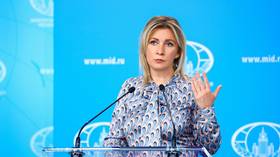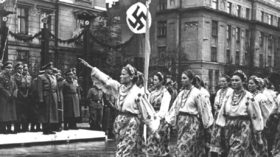EU planning Nazi Germany-inspired documents for Russians – Moscow

Moscow has accused the European Union of taking pointers from Nazi Germany, as the 27-nation bloc mulls plans to issue special “democracy passports” to Russian opposition activists working toward regime change in the country.
Commenting on a recent draft document put under consideration by the European Parliament's Committee on Foreign Affairs this week, Russian Foreign Ministry spokeswoman Maria Zakharova said the bloc hoped to use Russian citizens as its “little helpers,” drawing comparisons to the policies of the Third Reich.
“It is known that during the years of Nazi occupation, persons wishing to cooperate with the German administration were offered to sign the so-called ‘Volkslist,’ a special document that played the role of [passport],” she said, adding that the EU had similarly proposed “passports for good Russians.”
The draft report, penned by Lithuanian MEP Andrius Kubilius, calls on the bloc to adopt a new sweeping strategy to pursue a “change of power in Russia,” saying it would work with “democratic forces” in and outside the country to topple the current leadership and establish a “transitional government.”
As part of that plan, the bloc suggested a new “democracy passport” and “special visa arrangements” for Russian opposition activists working “in exile” from EU member states, offering to scale back travel restrictions for dissident Russians.
“They have big plans,” Zakharova continued, going on to quote the EU policy paper. “Holders of ‘passports of democracy’ will become the backbone of the EU after ‘the victory of Ukraine and the defeat of Russia, which will open a window of opportunity for the transformation of Russia into democracy.’”
The spokeswoman noted that, under Soviet law during the Second World War, signing the German ‘Volklist’ was “qualified as treason” and “prosecuted to the fullest extent of the law,” calling on Russian legislators to “work out a possible reaction if the European Parliament approves such decisions.”
The European Union has imposed heavy sanctions on Russia since the conflict with Ukraine escalated in February 2022, also approving a long list of arms transfers to Kiev. It said it would continue those policies in the near term, hoping for a “decisive Ukrainian victory” that would ultimately pave the way to “fundamental political changes in Russia.”













